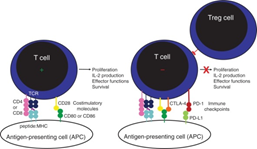T-Cell Responses
- T cells (also called T lymphocytes) are one of the major components of the adaptive immune system.
- Their roles include directly killing infected host cells, activating other immune cells, producing cytokines and regulating the immune response.
- According to recent research natural exposure or infection with the novel coronavirus may “prevent recurrent episodes of severe COVID-19”.
- The study found SARS-CoV-2-specific T cells even in family members who have been exposed to the virus but have tested negative on antibody blood tests.
- All categories of people recovered from moderate or severe COVID-19 disease, or in the convalescent phase after mild or severe disease or exposed family members or healthy people exhibited “robust memory T cell responses months after infection, even in the absence of detectable circulating antibodies specific for SARS-CoV-2.
- This indicates a previously unanticipated degree of population-level immunity against COVID-19.
- This implies that seroprevalence (the level of a pathogen in a population, as measured in blood serum) as an indicator may underestimate the extent of immunity in the population.
- Even as antibodies wane with time, robust T cell memory formed after SARS-CoV-2 infection suggests that “potent adaptive immunity is maintained to provide protection against severe re-infection”.


